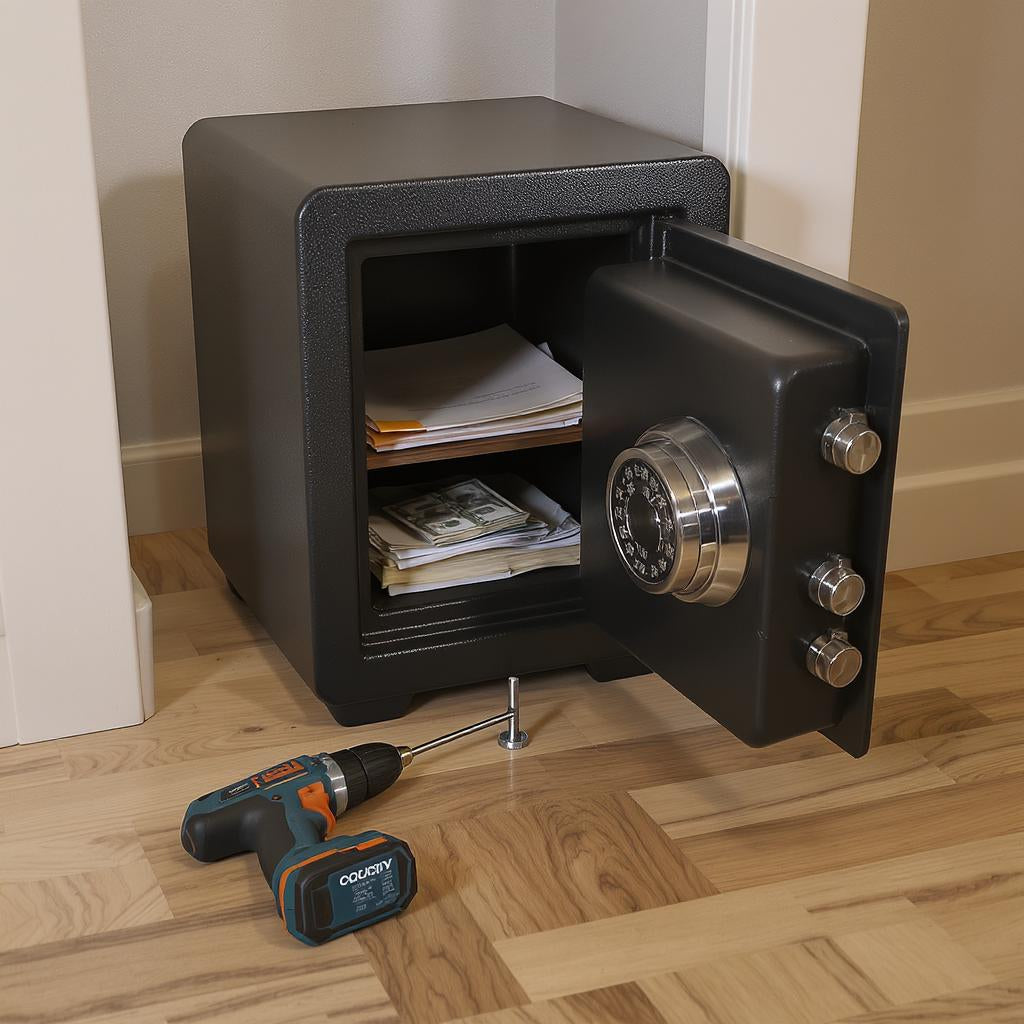Bolting your safe down is one of the most effective ways to keep it secure. But what if your floors are wooden? Many homes, flats, and even some business units have timber flooring—so is it safe to bolt into it?
The short answer: Yes, you can bolt a safe to a wooden floor—but how you do it matters. Here’s what you need to know.
Why Bolting Your Safe Matters
Even the heaviest safe can be lifted, tilted, or dragged if it isn’t fixed in place. Bolting your safe to the floor:
-
Prevents burglars from removing it entirely
-
Reduces tipping risks (especially in tall or narrow safes)
-
Meets many insurance requirements (especially for AiS-approved safes)
Wooden floors add an extra layer of consideration, but they don’t rule out secure installation.
Can You Bolt to Timber Safely?
Yes, but not all wood floors are created equal.
You can bolt a safe to timber if:
-
The boards are thick and solid (not just laminate or chipboard)
-
There’s solid joist structure beneath
-
You use the correct fixings for wood
Avoid direct bolting into:
-
Floating laminate floors
-
Thin floorboards with no structural support
-
Raised floors with voids underneath (unless reinforced)
Tip: Always check what’s beneath the surface. A floorboard might look solid, but it could be suspended above a cavity.
How to Bolt a Safe to a Wooden Floor
Here’s how professionals usually secure a safe to timber flooring:
1. Identify the joists: Use a stud finder or drill a test hole to locate the wooden joists below the boards. These provide real anchoring strength.
2. Use appropriate fixings: Wood screws or coach bolts with washers work best. Avoid masonry anchors or rawl plugs—those are for concrete.
3. Pre-drill holes: Mark the safe’s bolt holes, then pre-drill using a bit slightly smaller than the screw diameter. This prevents splitting.
4. Insert bolts and tighten securely: Use a socket wrench or screwdriver. Add a metal washer under each bolt head for stability.
5. Test for movement: Once bolted, give the safe a firm shake. If it shifts, reassess the fixings or location.
Optional: Place a rubber mat or padding under the safe to reduce vibration and protect the wood finish.
Best Safe Types for Wooden Floors
Some safes work better with wooden floor installations than others:
Home Safes (10–50L):
-
Good for documents, passports, cash, and jewellery
-
Lighter weight makes them easier to secure to joists
Fireproof Safes:
-
Heavier due to insulation but can be safely fixed with strong bolts
-
Choose ones with base fixings designed for timber or dual-purpose floors
Burglary-Rated Safes (Grade 0 and above):
-
Often required to be bolted for insurance
-
May need professional installation if floor reinforcement is needed
Underfloor Safes:
-
Not suitable for wooden floors unless installed with concrete support
Furniture and Compact Safes:
-
Can be bolted inside cupboards or drawers with reinforced wood bases
Alternatives if You Can’t Bolt Down
If your floor doesn’t allow for secure bolting, consider these options:
-
Wall anchoring: Fix the safe to a solid brick or concrete wall nearby
-
Furniture concealment: Hide the safe inside a bolted-down cabinet or chest
-
Floorboard reinforcement: Add a plywood sheet or metal plate beneath the safe
-
Weighted base: Add internal ballast to increase weight and reduce mobility
These options won’t offer the same level of security as full bolting but are better than leaving the safe free-standing.
Common Mistakes to Avoid
-
Using the wrong bolts: Masonry anchors won’t grip timber properly
-
Assuming all floors are the same: Victorian homes often have different floor structures than new-builds
-
Not checking below: Always make sure you're not drilling into pipes or electrical lines
-
Skipping bolt-down completely: A safe that isn’t fixed is easier to steal—even small ones
Final Thoughts
Yes, you can bolt a safe to a wooden floor—and it’s often a smart move. Whether you're securing a home safe, fireproof model, or business-grade unit, the right fixings and floor check make all the difference.
If you're unsure, a professional installer can assess your floor and handle the bolt-down safely. You don’t have to compromise security just because you have timber floors.

